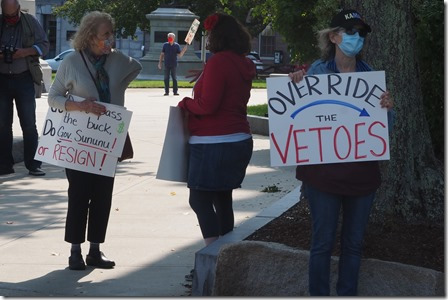By ARNIE ALPERT
It almost felt like normal times at the State House this morning. With the Senate about to convene, there were a dozen members of the Kent Street Coalition, with signs and a “Sununu Veto Graveyard” depicting the 79 bills vetoed by Governor Chris Sununu in the past two years. The occasion was known as Veto Override Day, when legislators have a chance to undo vetoes with votes by two-thirds majorities in both the House and Senate.
The day’s agendas included consideration of 22 vetoed bills, including ones to raise the state’s minimum wage, create a family and medical leave insurance program, strengthen the net metering policies for solar and wind energy development, expand tenant rights, protect reproductive rights, add protections for workers, implement voting reforms, and more. The governor set a record last year with 57 vetoes, only two of which were overridden.
House Bill 731, which would re-establish the state’s minimum wage and raise it in two steps to $12 an hour by 2023 drew support from members of the NH Alliance for a Moral Economy, who mustered outside the House of Representatives session at the Whittemore Arena in Durham. Rev. Gail Kinney called the issue of wages a matter of “morality and immorality.”
Standing outside the arena, where UNH athletes play hockey but today a meeting place where the nearly 400 House members could safely spread out and debate Sununu’s vetoes, Kinney called on the governor and legislators to “face the facts” of a labor market in which workers can be paid as little as $7.25 an hour, the federal minimum.
“No full time worker in the state of NH who makes $7.25 an hour or $8.25 an hour or even 9 dollars an hour can afford a roof over his or her head, or food on the table, and they can’t care for or clothe a child on that kind of wage,” Kinney said, adding that in some areas of the state it would take twice that wage or even three times that wage for workers to get by.
“We know that when workers are condemned to a life of poverty and constant economic anxiety the entire community fabric suffers,” she added. “Smart employers know too, that if they pay enough they can attract good workers and those workers will stay with them. A decent wage is a good business investment.”
Kinney’s perspective was later echoed by Dan Feltes, the Senate Majority Leader who is also the Democratic candidate for governor. Speaking at a news conference by the State House steps, Senator Feltes noted that workers in restaurants and grocery stores are the ones suffering from low wages and blasted the governor for twice vetoing bills that would raise pay at the bottom end of the labor market. “At the same time giving himself a $31,000 pay raise, he vetoes a minimum wage increase for our frontline workers.”
115,000 workers would benefit from a higher minimum wage, according to Feltes.
Sununu has said raising the minimum wage would be “dumb” and “disastrous,” Feltes said, “just like when he called paid family leave ‘a vacation.’”
“He can’t help but insult hard working Granite Staters,” charged Feltes, one of the legislature’s prime sponsors of the family leave proposal.
Speaking to the Moral Economy group, M.K. Guilfoyle, a Dover resident, gave personal testimony about family leave. She explained that at age 22 she was diagnosed with Hodgkin’s Lymphoma, requiring her to get intensive therapy. Her parents exhausted their own sick leave and vacation time to care for her, she explained. Family Medical Leave Insurance, like the program vetoed last year and this year by Governor Sununu, would have eased the burden on her family and made it easier for her to re-enter the workforce when she regained her health.
“What happened to the moral compass of the governor?” Rev. Kinney asked.
“Sununu presents himself as a moderate, but if you just take one look at the range of bills he has vetoed, many of which had bipartisan support, it is not a moderate record,” commented Louise Spencer, co-founder of the Kent Street Coalition.
“The governor didn’t come across the aisle” to talk with legislators, who work hard to craft bills. Instead of working with them to make the bills better, she said, Sununu just used his veto power to block anything he didn’t like.
Vetoes can be appropriate from Spencer’s perspective, but legislators deserve some deference as the body closest to the people who elected them. “A few vetoes are understandable, but when you are looking at 79 vetoes that is not giving deference to the duly elected legislature of the people.”
When the House and Senate sessions ended, all of the governor’s vetoes had been sustained. Expect the minimum wage, family leave, and energy policy to be debated from now until election day. Regardless of how the election turns out, the issues will be back in 2021, and so will members of the Kent Street Coalition and the NH Alliance for a Moral Economy.

Arnie Alpert is a retired activist, organizer, and community educator long involved in movements for social and economic justice. Arnie writes an occasional column Active with the Activists for InDepthNH.org.
The opinions belong to the writer. InDepthNH.org takes no position on politics, but welcomes diverse opinions.





